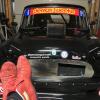Thanks rally, well I'd have never guessed sellotape but good call. Thank you
Special Tools Required For Engine Dismantle/build
#16

Posted 08 September 2016 - 02:13 PM
#17

Posted 08 September 2016 - 02:57 PM
Thanks rally, well I'd have never guessed sellotape but good call. Thank you
No worries, I was trying to think of something really obscure as all the proper answers had been taken care of.
And seeing as no one has suggested it..........don't forget a torque wrench.
Best of luck with the rebuild.....I enjoy engine builds.
#18

Posted 08 September 2016 - 02:59 PM
Ah yes have a torque wrench but good call. The one thing I haven't got and will need is an engine stand...!
#19

Posted 08 September 2016 - 03:19 PM
who needs an engine stand?
never used one.
#20

Posted 08 September 2016 - 03:22 PM
Ok, a strong workbench then as my wiry things struggle to hold all my tools!
#21

Posted 08 September 2016 - 03:37 PM
An engine stand is nice as you can spin a block with much less grunt......but it is not essential. And it's a bit of a pain bolting an A series to one as you have to bolt it to the front or rear of the block (as it sits in the engine bay) for it to be of any use and I've found the only real way to do that is by making up adapters.
#22

Posted 08 September 2016 - 05:20 PM
what for, to get all the iron filings off my clothes...?!
Well hopefully you won't have iron filings on your clothes during the rebuild..........see above comment for the real reason.
I almost always have iron filings. Tapping threads..
#23

Posted 08 September 2016 - 06:26 PM
#24

Posted 08 September 2016 - 06:54 PM
#25

Posted 08 September 2016 - 07:37 PM
who needs an engine stand?
never used one.
Fair enough and each to their own, but personally, I wouldn't do one without a stand these days. I used to do them on the bench (about 30 years ago) but got jack of turning the whole engine over a zillion times and trying to keep it all clean.
I've made an adaptor for my stand that lets me do the whole build from the Oil Filler Cap, to the Sump Plug and Pot Joints, including the Radiator and Clutch Cover.
#26

Posted 08 September 2016 - 08:00 PM
With regards to the measuring equipment – unless you have access to them and know how to use them you may well be better off asking for a specialist to do this for you. Unless you’re planning on doing loads of engine builds that is, the investment may well be worth it in that case
Edited by Fast Ivan, 08 September 2016 - 08:01 PM.
#27

Posted 08 September 2016 - 10:39 PM
Now if I was doing many then I am sure I would have one but for a one off assemble two big blocks of wood do.who needs an engine stand?
never used one.
Fair enough and each to their own, but personally, I wouldn't do one without a stand these days. I used to do them on the bench (about 30 years ago) but got jack of turning the whole engine over a zillion times and trying to keep it all clean.
I've made an adaptor for my stand that lets me do the whole build from the Oil Filler Cap, to the Sump Plug and Pot Joints, including the Radiator and Clutch Cover.
#28

Posted 09 September 2016 - 12:06 PM
With regards to the measuring equipment – unless you have access to them and know how to use them you may well be better off asking for a specialist to do this for you. Unless you’re planning on doing loads of engine builds that is, the investment may well be worth it in that case
When you can pick up good brands, used on eBay (and other auction sites) fairly cheaply then follow a few videos to learn how best to use and maintain the tools I'd say it's worth the cost if you're already elbow deep in a engine block.
Micrometers specifically, you only really need two sizes: 0-25mm and 25-50mm (or their imperial equivalents). That'll cover crank, cam and gearbox measurements. You might want larger sizes if you want to measure pistons and bores (the latter would need some telescoping gauges too but they aren't expensive either).
It's shouldn't break the bank if you're smart with your purchases.
Edited by Icey, 09 September 2016 - 12:07 PM.
#29

Posted 09 September 2016 - 01:52 PM
With regards to the measuring equipment – unless you have access to them and know how to use them you may well be better off asking for a specialist to do this for you. Unless you’re planning on doing loads of engine builds that is, the investment may well be worth it in that case
When you can pick up good brands, used on eBay (and other auction sites) fairly cheaply then follow a few videos to learn how best to use and maintain the tools I'd say it's worth the cost if you're already elbow deep in a engine block.
Micrometers specifically, you only really need two sizes: 0-25mm and 25-50mm (or their imperial equivalents). That'll cover crank, cam and gearbox measurements. You might want larger sizes if you want to measure pistons and bores (the latter would need some telescoping gauges too but they aren't expensive either).
It's shouldn't break the bank if you're smart with your purchases.
very good point and I wouldn't like to put people off learning how to use precision measuring equipment.
The only thing I would say is that buying a second hand mic with an unknown history and most likely out of calibration may not be the way forward
#30

Posted 09 September 2016 - 07:41 PM
In regards to measuring equipment, I think it fair to say don't expect to buy them, take them from the box and use them for the first time measuring your engine, especially internal cylindrical measurements, they really do take practice to do.
2 user(s) are reading this topic
0 members, 2 guests, 0 anonymous users




















